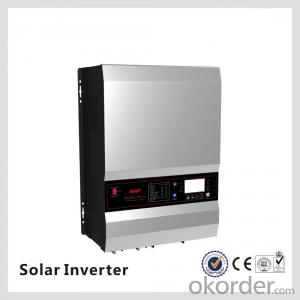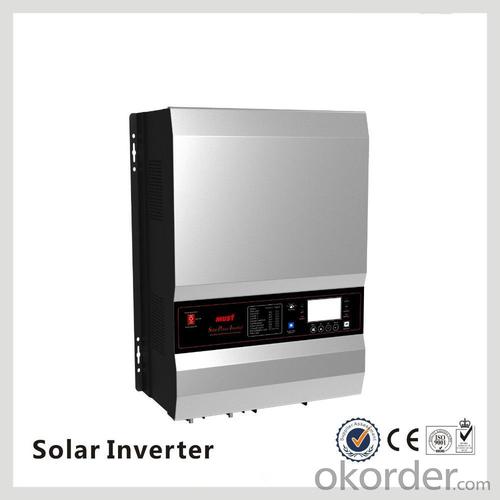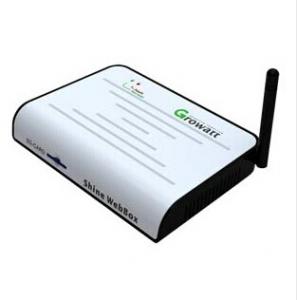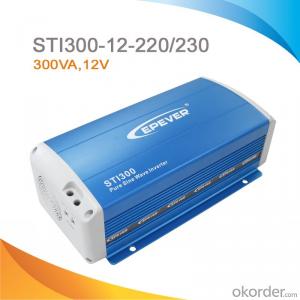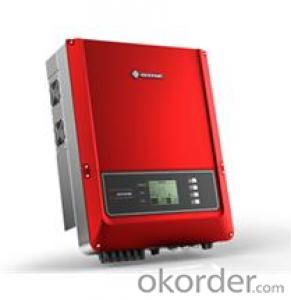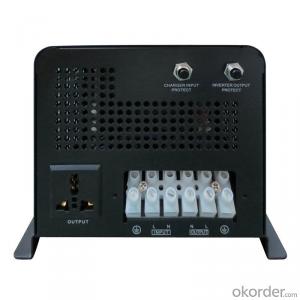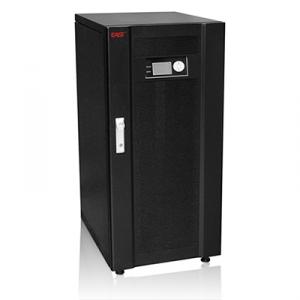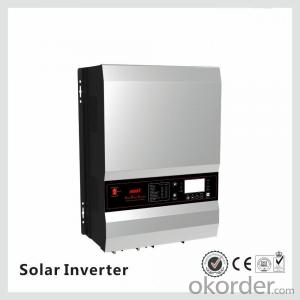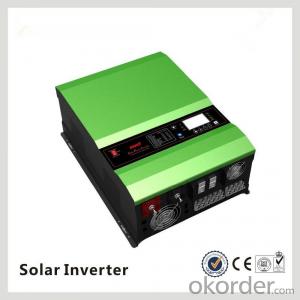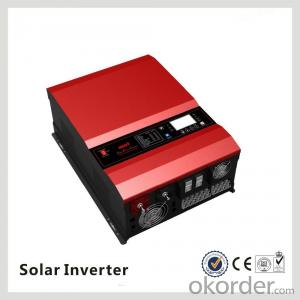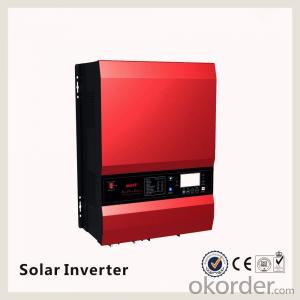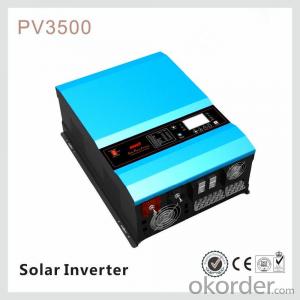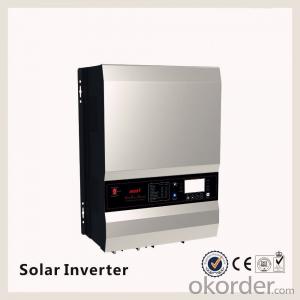Home Solar Inverter PV35-7K Low Frequency DC to AC Solar Power Inverter 12KW
- Loading Port:
- Shanghai
- Payment Terms:
- TT OR LC
- Min Order Qty:
- 1000 watt
- Supply Capability:
- 100000 watt/month
OKorder Service Pledge
OKorder Financial Service
You Might Also Like
Product Description
What is Solar inverter?
Solar pv inverters is an electronic system that operates the photovoltaic(PV) modules in a manner that allows the modules to produce all the power they are capable of. The solar mate charge controller is a microprocessor-based system designed to implement the MPPT. It can increase charge current up to 30% or more compared to traditional charge controllers.
Features
· Power range 1KW - 12KW
· Inbuilt pure copper transformer
· Powerful charge rate up to 100Amp
· MPPT solar charge controller 45A 60A (120A Option)
· PV input:145V max
· 12V/24V/36V/48V auto work
· MPPT efficiency>99% , Peak conversion efficiency>98%
· DSP processors architecture ensure high speed and performance
· Four-stages charging mode
· Protection: PV array short circuit, PV reverse polarity, Battery reverse polarity, Over charging, Output short circuit
· High efficency design & "Power Saving Mode" to coverse energy
Specification
MODEL | PV35-1K | PV35-2K | PV35-3K | PV35-4K | |||||||||||||||
Default Battery System Voltage | 12VDC | 24VDC | 12VDC | 24VDC | 12VDC | 24VDC | 12VDC | 24VDC | |||||||||||
INVERTER OUTPUT | Rated Power | 1KW | 2KW | 3000VA/2.4KW | 4000VA/3.2KW | ||||||||||||||
Surge Rating (20ms) | 3KW | 6KW | 9KW | 12KW | |||||||||||||||
Capable Of Starting Electric Motor | 1HP | 1HP | 1.5HP | 2HP | |||||||||||||||
Waveform | Pure sine wave/ same as input (bypass mode) | ||||||||||||||||||
Nominal Output Voltage RMS | 100V/110V/120VAC 220V/230V/240VAC(+/-10% RMS) | ||||||||||||||||||
Output Frequency | 50Hz/60Hz +/-0.3 Hz | ||||||||||||||||||
Inverter Efficiency(Peak) | >88% | ||||||||||||||||||
Line Mode Efficiency | >95% | ||||||||||||||||||
Power Factor | 0.8 | ||||||||||||||||||
Typical Transfer Time | 10ms(max) | ||||||||||||||||||
AC INPUT | Voltage | 230VAC | |||||||||||||||||
Selectable Voltage Range | 96~132VAC/155~280VAC(For Personal Computers) | ||||||||||||||||||
Frequency Range | 50Hz/60Hz (Auto sensing) 40-80Hz | ||||||||||||||||||
BATTERY | Minimum Start Voltage | 10.0VDC /10.5VDC for12VDC mode (*2 for 24VDC, *4 for 48VDC) | |||||||||||||||||
Low Battery Alarm | 10.5VDC+/-0.3V for12VDC mode (*2 for 24VDC, *4 for 48VDC) | ||||||||||||||||||
Low Battery Cutoff | 10.0VDC+/-0.3V for12VDC mode (*2 for 24VDC, *4 for 48VDC) | ||||||||||||||||||
High Voltage Alarm | 16.0VDC+/-0.3V for12VDC mode (*2 for 24VDC, *4 for 48VDC) | ||||||||||||||||||
High Battery Voltage Recover | 15.5VDC+/-0.3V for12VDC mode (*2 for 24VDC, *4 for 48VDC) | ||||||||||||||||||
Idle Consumption-Search Mode | <25W when power saver on | ||||||||||||||||||
CHARGER | Output Voltage | Depends on battery type | |||||||||||||||||
Charger AC Input Breaker Rating | 10A | 30A | 30A | 30A | |||||||||||||||
Overcharge Protection S.D. | 15.7VDC for 12VDC mode (*2 for 24VDC, *4 for 48VDC) | ||||||||||||||||||
Maximum Charge Current | 45A | 25A | 70A 35A | 90A 50A | 65A 40A | ||||||||||||||
BTS | Continuous Output Power | Yes Variances in charging voltage & S.D. voltage base on the battery temperature | |||||||||||||||||
BYPASS & PROTECTION | Input Voltage Waveform | Sine wave (grid or generator) | |||||||||||||||||
Nominal Input Frequency | 50Hz or 60Hz | ||||||||||||||||||
Overload Protection (SMPS Load) | Circuit breaker | ||||||||||||||||||
Output Short Circuit Protection | Circuit breaker | ||||||||||||||||||
Bypass Breaker Rating | 10A | 15A | 20A | 40A | |||||||||||||||
Max Bypass Current | 30Amp | ||||||||||||||||||
SOLAR CHARGER | Maximum PV Charge Current | 45A | |||||||||||||||||
DC Voltage | 12V/24V atuo work | ||||||||||||||||||
Maximum PV Array Power | 600W | 1200W | 600W | 1200W | 600W | 1200W | 600W | 3200W | |||||||||||
MPPT Range @ Operating Voltage(VDC) | 16-100VDC for 12V mode,32-100V for 24V mode | ||||||||||||||||||
Maximum PV Array Open Circuit Voltage | 100VDC | 147VDC | |||||||||||||||||
Maximum Efficiency | >98% | ||||||||||||||||||
Standby Power Consumption | <2w< span=""> | ||||||||||||||||||
MECHANICAL SPECIFICATIONS | Mounting | Wall mount | |||||||||||||||||
Dimensions (W*H*D) | 493*311*215mm | ||||||||||||||||||
Net Weight (Solar CHG) kg | 23.5 | 24.5 | 25.5 | 29.5 | |||||||||||||||
Shipping Dimensions(W*H*D) | 580*400*325mm | ||||||||||||||||||
Shipping Weight (Solar CHG) kg | 25.5 | 26.5 | 27.5 | 31.5 | |||||||||||||||
OTHER | Operation Temperature Range | 0°C to 40°C | |||||||||||||||||
Storage Temperature | -15°C to 60°C | ||||||||||||||||||
Audible Noise | 60dB MAX | ||||||||||||||||||
Display | LED+LCD | ||||||||||||||||||
Loading(20GP/40GP/40HQ) | 150pcs/300pcs/350pcs | ||||||||||||||||||
Images
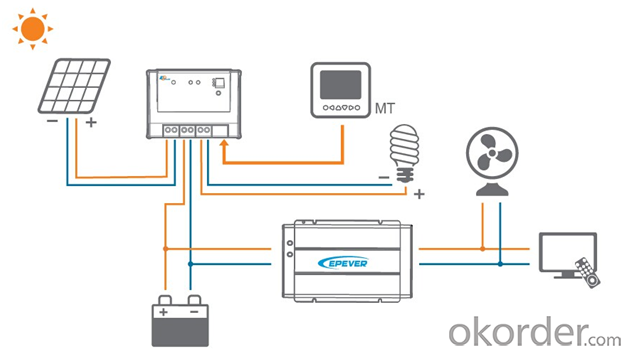
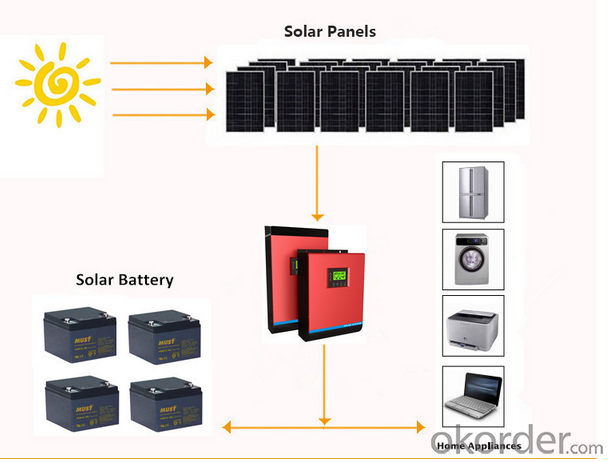
Packaging & Shipping
What is the packing?
1.Package: Carton Box for packaging, or Wooden Box advised for Samples to protect in transportations. Package designed by Clients is welcomed.
2.Shipping: DHL,FEDEX,UPS,EMS,AirWay and By Sea.
3.Payment: T/T( telegraphic transfer (T/T) and Western Union
4.Welcome to your Sample Order to test First.
FAQ
Q1: How to choose a right inverter?
A1:Tell us your demand, then our sales will recommend a suitable inverter to you.
Q2: What's the different between inverter and solar inverter?
A2: Inverter is only accept AC input, but solar inverter not only accept AC input but also can connect with solar panel to accept PV input, it more save power.
Q3: How about the delivery time?
A3: 7 days for sample; 25 days for bulk order.
- Q: Can a solar inverter be used in a mobile or RV application?
- Yes, a solar inverter can be used in a mobile or RV application. It allows the conversion of direct current (DC) from solar panels into alternating current (AC) that can be used to power appliances, devices, and other electrical equipment inside the mobile or RV. This enables the vehicle to utilize solar energy for various power needs while on the move.
- Q: What is the maximum power rating of a solar inverter?
- The maximum power rating of a solar inverter typically depends on the specific model and manufacturer. It can range from a few hundred watts for small residential inverters to several megawatts for large-scale commercial or utility-grade inverters.
- Q: How does a solar inverter handle grid voltage variations?
- A solar inverter handles grid voltage variations by continuously monitoring the voltage levels of the grid. When the grid voltage increases or decreases beyond a certain range, the inverter adjusts its output voltage accordingly to maintain a stable and consistent supply of electricity. This ensures that the solar power system remains synchronized with the grid and prevents any damage to the inverter or the connected equipment.
- Q: Can a solar inverter be used in systems with different module orientations?
- Yes, a solar inverter can be used in systems with different module orientations. Solar inverters are designed to convert the direct current (DC) generated by the solar panels into alternating current (AC) that can be used to power electrical devices. They are compatible with various module orientations, including both portrait and landscape orientations. However, it is important to consider the efficiency and performance of the solar system when installing modules with different orientations, as it may affect the overall energy production.
- Q: What is the role of an MPPT (Maximum Power Point Tracking) inverter?
- The role of an MPPT (Maximum Power Point Tracking) inverter is to optimize the conversion of solar energy into usable electricity. It constantly tracks and adjusts the operating point of the solar panels to ensure that they are always operating at their maximum power point, which maximizes the efficiency and output of the solar system.
- Q: Can a solar inverter be used in systems with multiple inverters?
- Yes, a solar inverter can be used in systems with multiple inverters. In fact, using multiple inverters is a common practice in larger solar power systems. Each inverter is connected to a separate set of solar panels, and they work together to convert the DC power generated by the panels into AC power that can be used in homes or businesses. Multiple inverters allow for increased power output and better system efficiency.
- Q: Can a solar inverter be used for commercial applications?
- Yes, a solar inverter can definitely be used for commercial applications. In fact, solar inverters are commonly utilized in commercial settings to convert the direct current (DC) electricity generated by solar panels into usable alternating current (AC) electricity that can power various commercial appliances and equipment.
- Q: Can a solar inverter be used with different types of power conditioning units?
- No, a solar inverter is specifically designed to work with solar power conditioning units. It may not be compatible with other types of power conditioning units such as wind or hydro power systems.
- Q: Can a solar inverter be used with a solar-powered heating system?
- Yes, a solar inverter can be used with a solar-powered heating system. The solar inverter converts the direct current (DC) generated by the solar panels into alternating current (AC) which can be used to power various appliances, including a heating system. This allows the solar panels to provide clean and renewable energy for heating purposes.
- Q: How does a three-phase solar inverter differ from a single-phase inverter?
- A three-phase solar inverter differs from a single-phase inverter in terms of the number of input and output phases it can handle. While a single-phase inverter can only handle a single-phase input and output, a three-phase inverter is designed to handle three-phase input and output. This allows for a more efficient and balanced distribution of power in three-phase electrical systems, making three-phase inverters suitable for larger solar installations or commercial applications.
Send your message to us
Home Solar Inverter PV35-7K Low Frequency DC to AC Solar Power Inverter 12KW
- Loading Port:
- Shanghai
- Payment Terms:
- TT OR LC
- Min Order Qty:
- 1000 watt
- Supply Capability:
- 100000 watt/month
OKorder Service Pledge
OKorder Financial Service
Similar products
Hot products
Hot Searches
Related keywords
